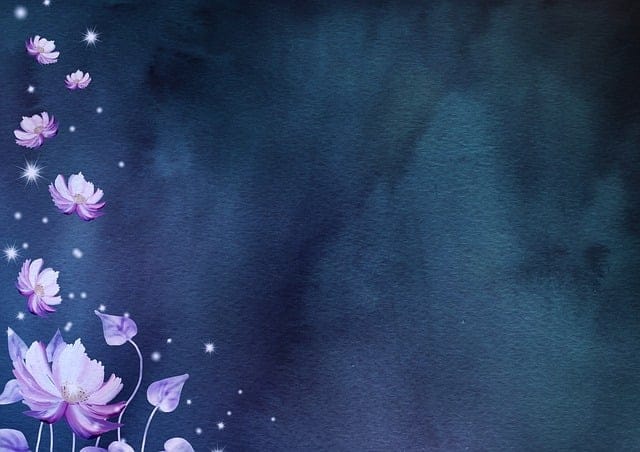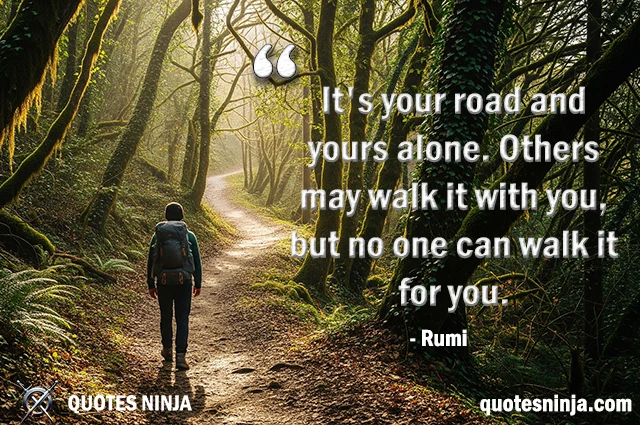
Deeper Meaning of Philosophical Quote:
Philosophical quote: “It’s your road and yours alone. Others may walk it with you, but no one can walk it for you.” by Rumi
Rumi Jalāl al-Dīn Muḥammad Rūmī, or simply Rumi, was a 13th-century poet, Hanafi faqih, Islamic scholar, Maturidi theologian, and Sufi mystic born during the Khwarazmian Empire. However, this quote is about personal responsibility, individuality, and the uniqueness of each person’s life journey.
Here’s a breakdown of the meaning:
 “It’s your road and yours alone.”
“It’s your road and yours alone.”
- Life is your own unique path — no one else has lived exactly your experiences, felt your emotions, or faced your exact challenges.
- It means you are the only one ultimately responsible for the direction your life takes.
- Even if others influence or support you, the path still belongs to you.
 “Others may walk it with you, but no one can walk it for you.”
“Others may walk it with you, but no one can walk it for you.”
- Family, friends, or mentors can support, accompany, or guide
- But they cannot make your decisions, feel your pain, or do your growing for you.
- You must face your challenges, make your choices, and own the consequences — both good and bad.
In essence,
This quote encourages self-ownership, courage, and authenticity:
- Don’t wait for others to lead your life or blame others for where you are.
- Don’t compare your path to others — yours is valid, even if it’s harder or slower.
- It’s about trusting yourself to keep moving forward, even when you’re uncertain or alone.
Here’s a story inspired by Philosophical Quote “It’s your road and yours alone. Others may walk it with you, but no one can walk it for you.”
Philosophical Story: “A Road of Her Own“
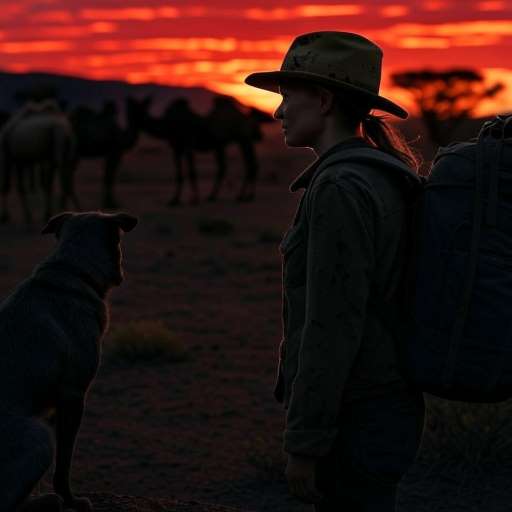
The First Step:
The desert didn’t greet her with kindness. It didn’t offer comfort, or even understanding. It simply was. Vast, dry, and endless — a world stripped bare. But that’s exactly what Robyn Davidson had come looking for.
In 1977, with four camels, a dog, and a heart full of defiance, Robyn began her 1,700-mile journey across the Australian outback. Many called her foolish. Others, brave. But few truly understood. She wasn’t running away. She was walking toward something — even if she didn’t yet know what.
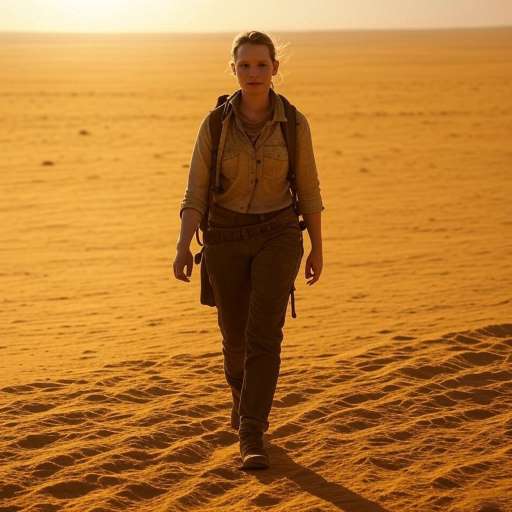
Walking Alone in the Desert:
At first, the road welcomed distractions. National Geographic had agreed to sponsor her trek in exchange for photos and journal entries. So, once in a while, photographer Rick Smolan appeared, capturing her moments under the harsh sun. He brought food, comfort, and, sometimes, doubt. His presence reminded her that the world was still watching. But the path — her path — remained untouched by cameras.
Even early on, she realized something essential: no one could walk this road for her.
Friends and strangers could support her, advise her, even join her for a few miles — but the sand beneath her feet, the blistering silence, and the burden of her pack were hers alone.
As the days passed, her legs ached, and her resolve cracked. Still, she pushed forward. Meanwhile, her relationship with the camels deepened. At first, they resisted her — wild and stubborn creatures. But over time, like the desert itself, they stopped testing her. Perhaps they saw her spirit mirrored in their own: untamed and persistent.
Then came the moments of doubt. She faced a broken water pump, scorching heat, and haunting loneliness. Some nights, fear curled up beside her in the tent. What if she failed? What if the desert swallowed her whole, without even remembering her name?
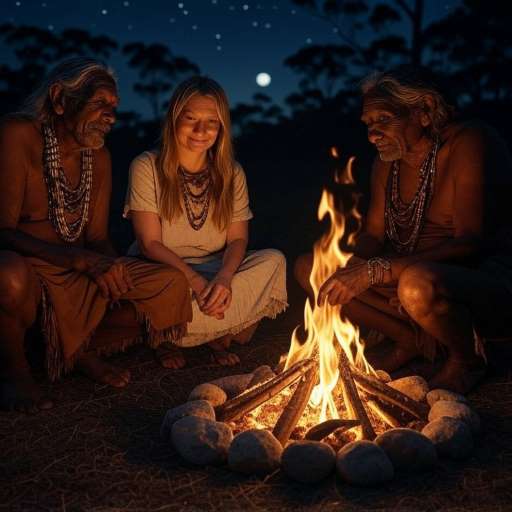
A Moment of Connection:
But each morning, she rose with the sun and started walking again. In those hours, when only the wind whispered through red dunes, she understood the truth of her journey. She hadn’t come for attention. She hadn’t come to prove anything to anyone else. She came to belong — to the land, to herself.
Throughout the trek, she met Aboriginal elders who walked parts of the way with her. They didn’t question her purpose. They simply walked, shared stories, and honored her solitude. Their quiet acceptance affirmed what she’d come to believe: we may walk together, but we do not walk for one another.
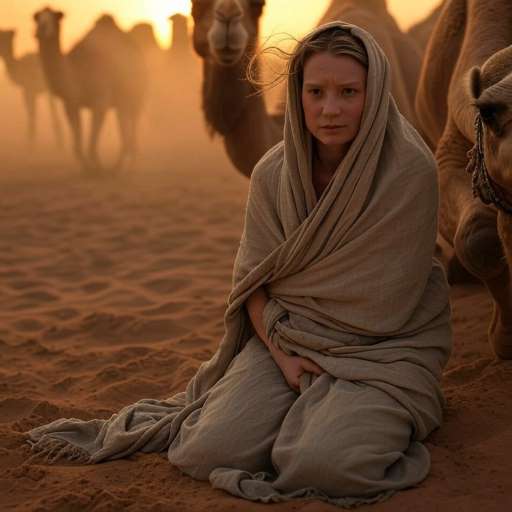
The Sandstorm:
One day, a sandstorm rolled across the plain. It erased her footprints, blurred the sky, and swallowed her in isolation. Panic scratched at her chest. She could’ve turned back. She could’ve called for help. But instead, she knelt, wrapped herself in cloth, and waited. The storm passed — and she was still there. Not unharmed, but unbroken.
That night, she wrote: “The desert taught me that silence is not emptiness. It’s a presence — fierce, demanding, and sacred.”
Robyn changed with the land. Each step stripped away doubt and distraction. She laughed louder. She spoke less. She cried only when she needed to, not when the world expected her to. There was no applause, no cheering crowd. Just sky, earth, and the echo of her breath.
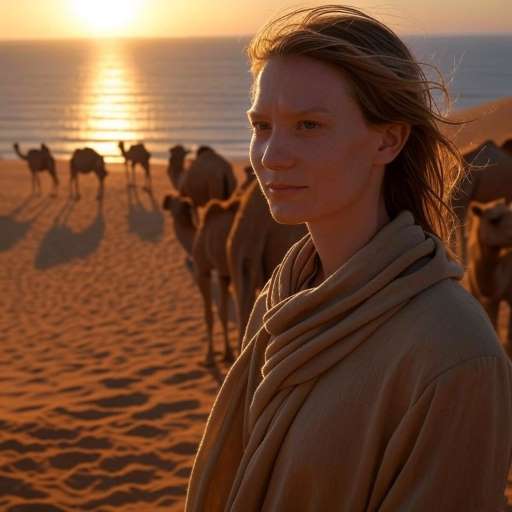
The Final Dune:
Weeks later, nearing the Indian Ocean, she crested the final dune and saw the sea. The vast blue spread before her like a promise finally fulfilled. But she didn’t cheer. She didn’t sprint. Instead, she stopped, looked back at the path she had carved through the sand, and breathed in deeply.
This was the moment people always asked about: “Was it worth it?” “What did you find?” But there were no perfect answers. Robyn hadn’t found all the things she thought she would. And yet, she’d discovered something far more vital — the power of choosing her road and staying on it, even when it hurt.
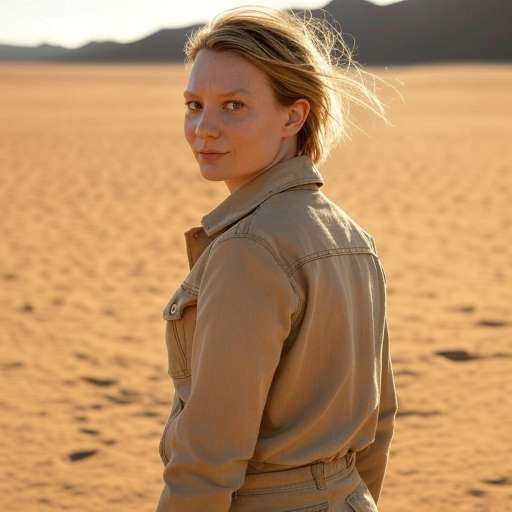
Looking Back:
Years later, in interviews and essays, people still try to define her journey. Some call it a feminist statement. Others say it was spiritual. Robyn often smiles politely, then shrugs. To her, it was simple:
“It was my road. Others walked with me — Rick, the elders, the camels. But no one walked it for me.”
That truth, more than any photograph or magazine spread, was the real treasure she carried home from the desert.
Here is the ending of philosophical story from the quote “It’s your road and yours alone. Others may walk it with you, but no one can walk it for you.”
Moral of the story:
True growth and self-discovery come from walking your own path — even if it’s difficult, lonely, or misunderstood.
While others may support or accompany you for parts of your journey, no one can live your life, face your challenges, or make your choices for you. You must have the courage to keep going, trust yourself, and embrace the solitude that often comes with walking your own road.
This story reminds us that:
- Independence is not isolation — it’s ownership.
- Struggle is not failure — it’s transformation.
- Solitude is not emptiness — it can be sacred space for growth.
To explore more on stories and dive into related ideas, be sure to check out the other posts where we cover all sort of stories related to quotes. Stay tuned for more…..
To explore more on quote topics, be sure to check out the other topics where we cover all categories of quotes. Stay tuned for more…..

